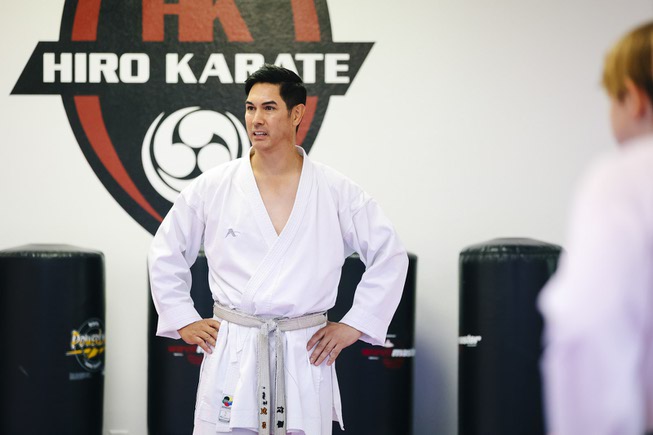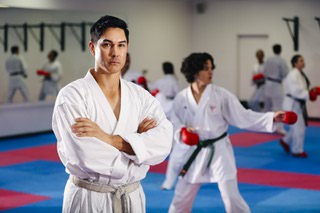
Karate instructor/dojo owner Hiroshi Allen trains a class at Hiro Karate in Summerlin Monday, June 27, 2022.
Tuesday, July 5, 2022 | 2 a.m.
Everything the athletes at Hiroshi Allen’s Summerlin karate studio do, they do through the lens of a cutting-edge, widely used sports psychology philosophy developed just across town at UNLV.
With training in The Optimum Performance Program in Sports, or TOPPS, several are preparing for the USA Karate National Championships this week in Washington state.
Allen is a veteran in karate competition and instruction. He’s led highly decorated athletes before.
“But then in the years that we have had TOPPS, we’ve been dominant,” said Allen, who has been teaching karate in Las Vegas since 2001. “We’ve had more of our students on the U.S. junior and U.S. national teams since that time. The results clearly speak for themselves. I haven’t really coached much differently on the skillset side, so I really believe that TOPPS has made the difference.”
Before Allen’s students begin a drill, they say a motivational statement. Then they perform the physical skill.
It becomes ingrained, he said.
TOPPS was developed by Brad Donohue, a UNLV psychology professor and former boxer, who turned the pathologically driven nature of clinical psychology into a positive perpetual learning and growing experience for athletes. It preserves and enhances their mental health alongside their athletic performance.
When Donohue says psychology is pathologically driven, it means that people typically pursue therapy when something is wrong. He frames his approach positively, by calling it a performance plan rather than treatment plan. He lays a groundwork of best experiences, recognizes and praises them, then plots out how to make them even better.
TOPPS works with peewee hockey players, internationally ranked karateka, Cirque du Soleil performers, Olympic-caliber swimmers at the local Sandpipers swim club, recreational fencers and UNLV athletes.
Donohue also recommends it for business leaders, creatives and any professional. He’s also seen it incorporated into social-emotional learning among schoolchildren in Florida, and he’s pitched it to local school leaders as well.
All people who adopt TOPPS have something in common. “They all share an interest in performance optimization,” Donohue said.
To be optimal is to do the best you can do at the time, he said. Using the TOPPS approach — which he dispenses through workshops and refines through research at the university — he asks people what they did optimally and acknowledges it for being their best at the time. Then he asks them how to be even better.
It’s an introspective, mindful, supportive and self-forgiving approach. It also has the distinction of being developed, over six years, with $2 million from the National Institutes of Health, giving it scientific credibility and rigor.
Donohue said TOPPS was the first program to address mental health and sport performance at the same time. He’s presented to conferences and universities internationally, and a training manual is set for release this fall.
Kenny Brooks, the director of hockey and development for the Las Vegas Storm youth club program, will implement TOPPS techniques for all 14 of his teams when their season starts in August. About 250 kids between ages 6 and 18 play ice hockey for the Storm, based out of the Las Vegas Ice Center.
As a coach, Brooks said he sees players “get in their own way” and let a mistake ruin their whole game, even though he doesn’t place an emphasis on winning and losing.
But Brooks knows how passionate young hockey players are. He grew up playing in Las Vegas, then played at Penn State and in the minor leagues. He said college and the pros had mental health programs, but by then, it felt too late.
“When I was growing up, this kind of stuff wasn’t talked about a lot,” he said.
Allen is a longtime TOPPS practitioner, applying the techniques with his students for about five years. He had recently completed a master’s degree in the psychology of performance when he heard about Donohue’s work. TOPPS resonated with him as the kind of plan he had been looking for and Donohue was a professional kindred spirit.
Allen racked up 17 national championships as a member of the U.S. National Karate Team. During the peak of his competition years in the 1990s, he had solid coaches, “but the one weakness that I knew that I had was my mental side.”
“When you compete at a really high elite level, everyone has (athletic) skills,” he added. “I knew that when I was even with an opponent, if I was beaten, I always felt that they’d beaten me mentally.”
His daughter Trinity is also all-in on the program. She’s a member of the U.S. national team, currently ranked No. 7 in the world and, at 21, is already the second-most decorated woman in USA Karate history. She is currently training in Kazakhstan for the upcoming World Games, which highlights sports not contested in the Olympics. And as a UNLV psychology student, she was a research assistant for Donohue.

